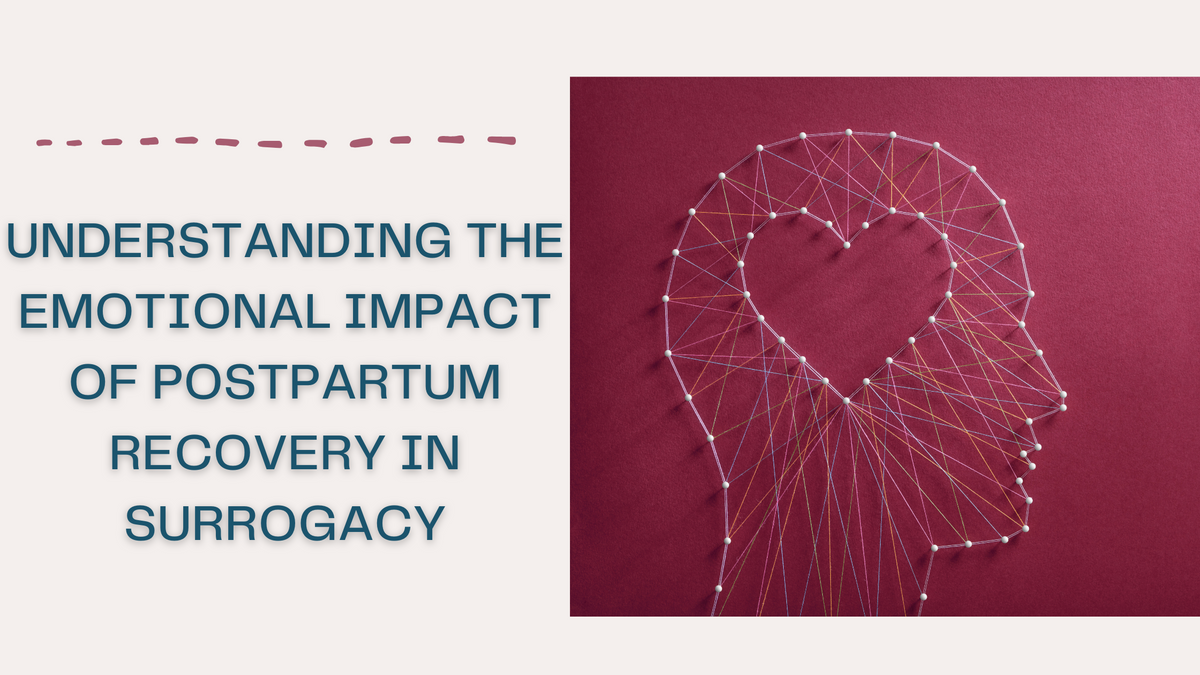The postpartum period is a unique time of transition for surrogates, bringing a distinct set of experiences and emotions. After carrying and delivering a child for another family, surrogates often encounter a mix of emotions and physical recovery needs. Understanding what to expect and how to support your emotional well-being during this period can make a world of difference in navigating postpartum recovery with confidence and care.
What to Expect Emotionally After Delivery
Surrogates may experience feelings that range from joy and fulfillment to sadness or a sense of emptiness. These emotions are natural and can vary widely from one surrogate to another. Here are some common emotional experiences during postpartum recovery in surrogacy:
Sense of Accomplishment and Joy: Many surrogates feel a deep sense of satisfaction and joy after helping a family fulfill their dream of parenthood. Seeing the intended parents hold their baby for the first time can be an incredibly rewarding experience.
Sadness or Grief: It's also normal to feel a sense of sadness or loss after delivery. This doesn’t necessarily mean regret; rather, it reflects the bond formed during pregnancy and the transition of no longer carrying the child. Understanding that these feelings are common and temporary can provide comfort.
Hormonal Fluctuations: After childbirth, hormonal changes are natural and can affect mood, energy, and emotional stability. Many surrogates experience what’s known as the “baby blues,” which is a short-term period of emotional ups and downs.
Feelings of Emptiness: Surrogates may feel a physical and emotional void after delivery, especially when they’ve dedicated many months or years to the surrogacy process. With the pregnancy completed, it’s normal to feel a sense of adjustment as you return to everyday life.
TAKE THE SURROGACY QUIZ CHAT WITH A SURROGATE
Physical Recovery and Self-Care Tips
Physical recovery after delivery is a significant part of the postpartum period. By taking care of your body, you can support your overall well-being and make the emotional transition smoother. Here are some essential self-care tips:
Rest and Recovery: Give yourself time to rest and recuperate. Delivery, whether vaginal or by C-section, places physical demands on the body, and adequate rest is vital for healing.
Nourishment and Hydration: Eating a nutritious diet and staying hydrated can boost energy levels and improve mood. Your body has just completed a big journey, so treat it kindly with balanced meals and plenty of water.
Gentle Exercise: Once your healthcare provider approves, engaging in gentle exercise like walking or yoga can improve mood and help with physical recovery. Physical activity releases endorphins, which can have a positive impact on emotional well-being.
Coping with Postpartum Emotions: Strategies for Surrogates
Navigating postpartum emotions can feel challenging, but there are many strategies and resources to help you feel supported and understood during this time.
1. Acknowledge Your Emotions
One of the most helpful steps is to acknowledge and accept your feelings without judgment. Postpartum emotions are a natural part of the journey, and allowing yourself to feel whatever comes up—whether it’s joy, sadness, or even ambivalence—can provide a sense of relief.
2. Connect with Your Support Network
Lean on family, friends, and other surrogates who understand the journey. Surrounding yourself with people who support you and respect your surrogacy decision can offer comfort and encouragement. Talking to others who have been through similar experiences can provide perspective and lessen feelings of isolation.
3. Consider Counseling or Therapy
For some surrogates, speaking with a mental health professional who specializes in postpartum or surrogacy-related experiences can be beneficial. Therapy provides a safe space to process your emotions, work through any unexpected feelings, and gain tools to navigate this unique time.
4. Stay Connected with the Intended Parents (if desired)
Many surrogates find comfort in staying connected with the intended parents, especially in the initial weeks after delivery. Seeing the baby thrive and witnessing the joy of the family can reinforce the impact of your gift. However, every relationship is unique, so it’s essential to communicate with the intended parents to set boundaries that feel right for everyone involved.
5. Focus on Your Personal Goals and Interests
Shifting your focus to personal goals, hobbies, or interests can help provide a sense of purpose as you transition out of the surrogacy journey. Many surrogates find it fulfilling to set new goals, whether they involve career aspirations, family activities, or personal development.
TAKE THE SURROGACY QUIZ CHAT WITH A SURROGATE
Resources and Support for Postpartum Surrogates
The journey doesn’t end after delivery, and there are various resources available to help surrogates through postpartum recovery:
Surrogacy Mentor Support: At Surrogacy Mentor, we offer resources, guidance, and a supportive community to help you navigate every phase of your surrogacy journey, including postpartum. Whether you need someone to talk to or resources for emotional wellness, we’re here to support you.
Online Communities and Support Groups: Many surrogates find value in online communities where they can connect with others who have shared similar experiences. These groups provide a safe space to ask questions, share stories, and receive support from fellow surrogates.
Embracing the Journey and Moving Forward
The postpartum period marks an important chapter in the surrogacy journey, one that allows surrogates to reflect on the impact they’ve made. It’s a time to prioritize self-care, honor your emotions, and find joy in the knowledge that you’ve helped create a family. Each surrogate’s experience is unique, and there’s no “right” way to feel or process the emotions that follow.

